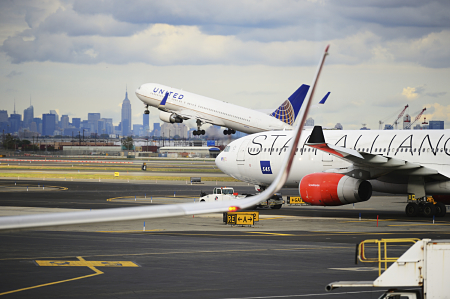Uber and Lyft drivers trying to operate at Newark Liberty International Airport have run into enforcement issues as Newark city police have ticketed hundreds of drivers for not having a municipal permit. Some vehicles have been towed.

The tickets came after the city of Newark first warned Uber and Lyft drivers of the enforcement, rescinded the decision and then started enforcing with a vengeance.
In February, Newark Chief Prosecutor Evans Anyanwu sent a letter to Uber’s general counsel in San Francisco, warning that the drivers were in violation of city codes.
“I have instructed our police department effective Feb. 22 to immediately tow Uber drivers operating in and around Newark Airport and Newark Penn Station,” Anyanwu wrote. The warning was temporarily rescinded before enforcement kicked in several weeks ago.
The Port Authority of New York and New Jersey, however, announced it would not be ticketing the Uber and Lyft drivers.
“We have received numerous inquiries over the past few days about the policy of this agency with regard to utilization of ridesharing firms such as Uber and Lyft at Newark Liberty International Airport. The Port Authority Police Department will not take steps to prevent access to such services by passengers or others on the premises owned or leased by the Port Authority of New York and New Jersey,” the Port Authority said in a statement to local media. “The Port Authority has a responsibility to provide safe and convenient services for travelers. It also recognizes that it must partner with local municipalities which host its facilities and will resolve any differences which may exist in a reasonable and fair manner.”
Uber spokesman Craig Ewer told local media that the company will “continue to stand by our driver-partners by fully compensating those subject to unjust fines or citations as a result of the city’s actions.”
Newark Mayor Ras Baraka said commercial vehicles have to be licensed to operate at the airport or train station and called for lawmakers to create legislation that addresses the ride-hail industry.
Uber responded to the city’s ban by starting a campaign to rally support for its drivers in Newark. The company started a direct mail campaign to sway public opinion.
Baraka told reporters that the ride-hail companies have to play by the same rules as taxi cab companies.
"We're talking about enforcing the rules for everyone," he said. "Taxi drivers wait two hours in line at the airport to pick up a fare - and Uber drivers cut around the line."
Baraka’s plan to enforce the permit issue is at odds with the Port Authority’s position that it will not enforce ride-hail companies at the airport or rail station.
The Port Authority police department sent a directive to its officers telling them that city law enforcement officers needed special permission to patrol at the airport.
Paul Nunziato, president of the Port Authority Police Benevolent Association, said city officers were not authorized to patrol at the airport.
John Degnan, chairman of the Port Authority’s board, said his agency’s lease with the city gives the Port Authority “exclusive discretion for law enforcement.”
Degnan said the NYPD has always given advanced notice of their intent to come onto airport property and he said he expects the city of Newark to do the same.
“I expect that the City of Newark is going to honor that,” he said of the lease. “They can do what they want on city streets.”
Uber spokesman Matthew Wing said there is no good reason for Baraka to take police officers off the streets of Newark — the state’s largest city — and redirect them to aggressively target Uber drivers.
“Instead of trying to make criminals out of the two thousand Newark residents who drive on the Uber platform, the mayor should focus on the many other pressing issues facing his city,” he said.
Jeff Shanker, president of the Limousine Association of New Jersey, says he is disappointed the Port Authority is refusing to cite Uber and Lyft drivers.
“We are appalled that they are allowing an operation that refuses to comply with the law,” he said.
At the root of the problem are the inroads Uber and Lyft have made into the taxi and limo industry’s market share. Shanker said drivers have invested hundreds of thousands of dollars into municipal licenses or medallions and have seen the value of those licenses plummet since Uber and Lyft entered the market.
